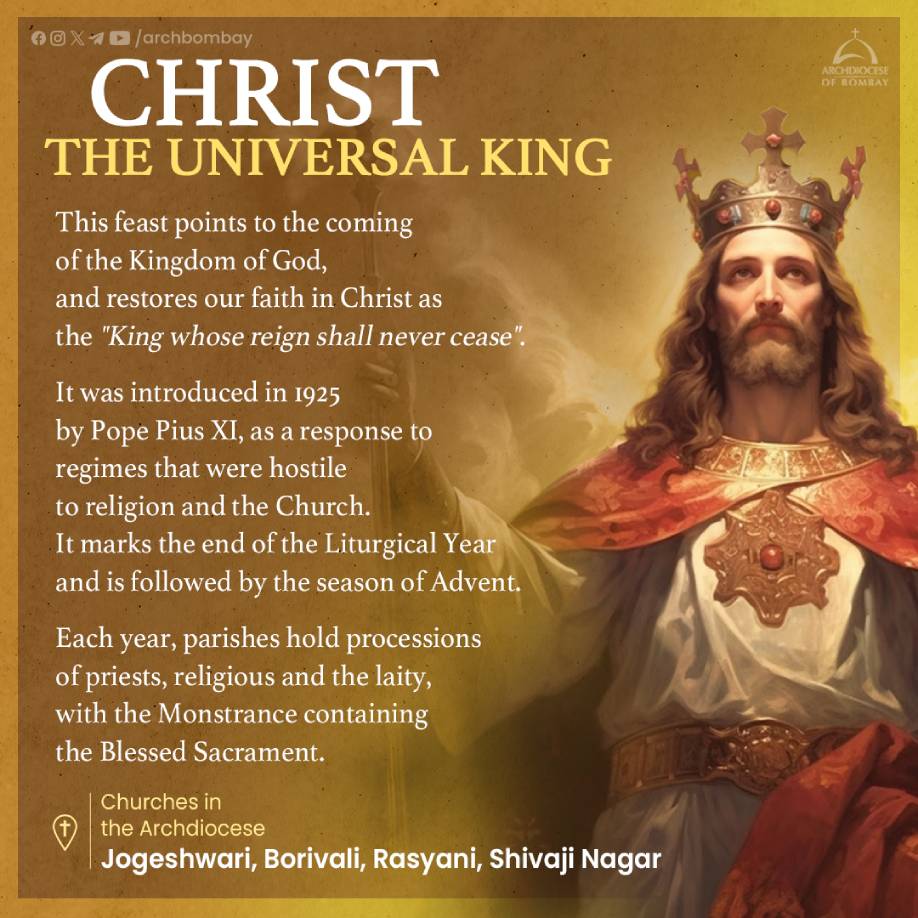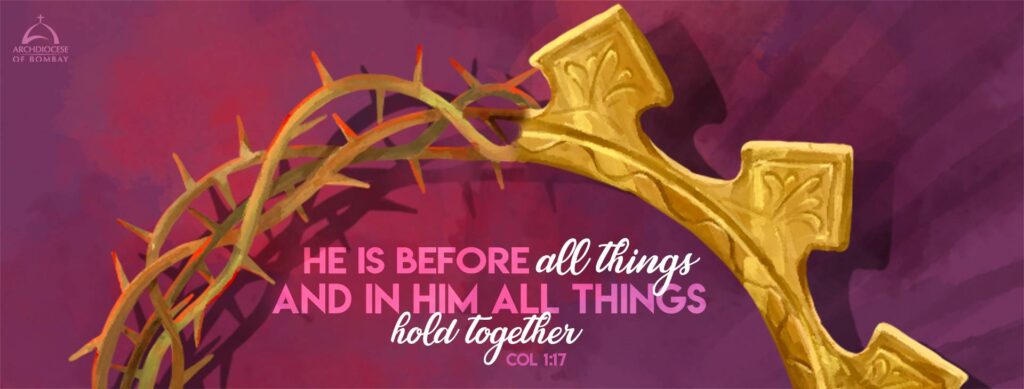Solemnity of Our Lord Jesus Christ, King of the Universe

The Solemnity of Our Lord Jesus Christ, King of the Universe, formerly referred to as “Christ the King,” was established by Pope Pius XI in 1925 as an antidote to secularism, a way of life which leaves God out of man’s thinking and living and organizes his life as if God did not exist. The feast is intended to proclaim in a striking and effective manner Christ’s royalty over individuals, families, society, governments, and nations.
Today’s Mass establishes the titles for Christ’s royalty over men:
- Christ is God, the Creator of the universe and hence wields a supreme power over all things; “All things were created by Him”;
- Christ is our Redeemer, He purchased us by His precious Blood, and made us His property and possession;
- Christ is Head of the Church, “holding in all things the primacy”;
- God bestowed upon Christ the nations of the world as His special possession and dominion.
Today’s Mass also describes the qualities of Christ’s kingdom. This kingdom is:
- supreme, extending not only to all people but also to their princes and kings;
- universal, extending to all nations and to all places;
- eternal, for “The Lord shall sit a King forever”;
- spiritual, Christ’s “kingdom is not of this world.”
COLLECT PRAYER
Almighty ever-living God, whose will is to restore all things in your beloved Son, the King of the universe, grant, we pray, that the whole creation, set free from slavery, may render your majesty service and ceaselessly proclaim your praise. Through our Lord Jesus Christ, your Son, who lives and reigns with you in the unity of the Holy Spirit, God, for ever and ever.

To Jesus Christ our Sovereign King
who is the world’s salvation,
All praise and homage do we bring
and thanks and adoration
Your reign extend O King benign,
to every land and nation;
For in your kingdom Lord divine
Alone do we find salvation
To you and to your Church, great King
We pledge our heart’s oblation;
Until before your throne we sing
In endless jubilatio
Christ Jesus, Victor!
Christ Jesus, Ruler!
Christ Jesus, Lord and Redeemer
A brief history
Pope Pius XI instituted The Feast of Christ the King in 1925 for the universal church, in his encyclical Quas Primas. He connected the increasing denial of Christ as king to the rise of secularism throughout much of Europe. At the time of Quas Primas, many Christians (including Catholics) began to doubt Christ’s authority and existence, as well as the Church’s power to continue Christ’s authority.
Pius XI, and the rest of the Christian world, witnessed the rise of non-Christian dictatorships in Europe, and saw Catholics being taken in by these earthly leaders. These dictators often attempted to assert authority over the Church. Just as the Feast of Corpus Christi was instituted when devotion to the Eucharist was at a low point, the Feast of Christ the King was instituted during a time when respect for Christ and the Church was waning, when the feast was needed most.
Pius hoped the institution of the feast would have various effects. They were:
1. That nations would see that the Church has the right to freedom, and immunity from the state (Quas Primas, 32).
2. That leaders and nations would see that they are bound to give respect to Christ (Quas Primas, 31).
3. That the faithful would gain strength and courage from the celebration of the feast, as we are reminded that Christ must reign in our hearts, minds, wills, and bodies (Quas Primas, 33).
Today, the same distrust of authority exists, although the problem has gotten worse. Individualism has been embraced to such an extreme, that for many, the only authority is the individual self. The idea of Christ as ruler is rejected in such a strongly individualistic system. Also, many balk at the idea of kings and queens, believing them to be antiquated and possibly oppressive. Some even reject the titles of “lord” and “king” for Christ because they believe that such titles are borrowed from oppressive systems of government. However true these statements might be (some kings have been oppressive), these individuals miss the point: Christ’s kingship is one of humility and service. Jesus said:
You know that those who are recognized as rulers over the Gentiles lord it over them, and their great ones make their authority over them felt. But it shall not be so among you. Rather, whoever wishes to become great among you will be your servant; whoever wishes to be first among you will be the slave of all. For the Son of Man did not come to be served, but to serve, and to give his life as a ransom for many (Mark 10:42-45, NAB).
and
Pilate said to Jesus, “Are you the King of the Jews?”… Jesus answered, “My kingdom does not belong to this world. If my kingdom did belong to this world, my attendants would be fighting to keep me from being handed over to the Jews. But as it is, my kingdom is not here.” So Pilate said to him, “Then you are a king?” Jesus answered, “You say I am a king. For this I was born and for this I came into the world,to testify to the truth (John 18:33b, 36-37).
Thus, Jesus knew the oppressive nature of secular kings, and in contrast to them, he connected his role as king to humble service, and commanded his followers to be servants as well. In other passages of Scripture, his kingdom is tied to his suffering and death. While Christ is coming to judge the nations, his teachings spell out a kingdom of justice and judgment balanced with radical love, mercy, peace, and forgiveness. When we celebrate Christ as King, we are not celebrating an oppressive ruler, but one willing to die for humanity and whose “loving-kindness endures forever.” Christ is the king that gives us true freedom, freedom in Him. Thus we must never forget that Christ radically redefined and transformed the concept of kingship.
Christ the King Sunday used to be celebrated on the last Sunday of October, but since the calendar reforms of 1969, the feast falls on the last Sunday of Ordinary Time, which is the Sunday before Advent. It is fitting that the feast celebrating Christ’s kingship is observed right before Advent, when we liturgically wait for the promised Messiah (King).
Source : ChurchYear
A partial indulgence is granted to the faithful, who piously recite the Act of Dedication of the Human Race to Jesus Christ King. A plenary indulgence is granted, if it is recited publicly on the feast of our Lord Jesus Christ King.
Act of Dedication of the Human Race to Jesus Christ King
Most sweet Jesus, Redeemer of the human race, look down upon us humbly prostrate before you. We are yours, and yours we wish to be; but to be more surely united with you, behold each one of us freely consecrates himself today to your Most Sacred Heart. Many indeed have never known you; many, too, despising your precepts, have rejected you. Have mercy on them all, most merciful Jesus, and draw them to your Sacred Heart. Be King, O Lord, not only of the faithful who have never forsaken you, but also of the prodigal children who have abandoned you; grant that they may quickly return to their Father’s house, lest they die of wretchedness and hunger. Be King of those who are deceived by erroneous opinions, or whom discord keeps aloof, and call them back to the harbor of truth and the unity of faith, so that soon there may be but one flock and one Shepherd. Grant, O Lord, to your Church assurance of freedom and immunity from harm; give tranquility of order to all nations; make the earth resound from pole to pole with one cry: Praise to the divine Heart that wrought our salvation; to it be glory and honor for ever. Amen.
Prayer Source: Enchiridion of Indulgences. June 29, 1968